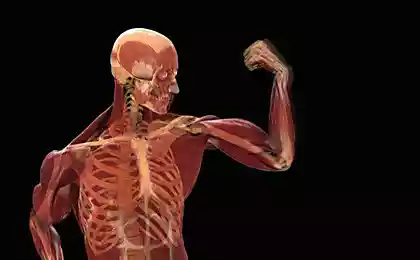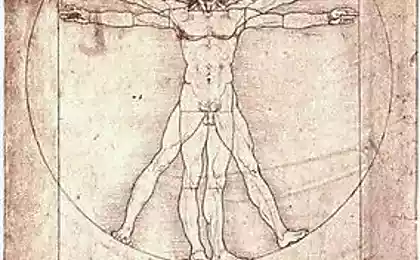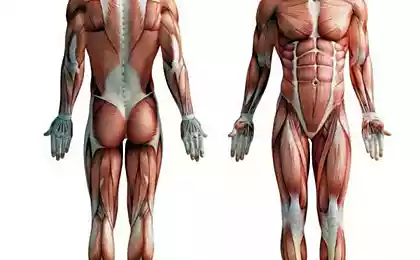747
15 facts about the human body
15 interesting things about your body that you may be still unknown.
1. Gastric acid is so strong that they can dissolve the zinc. Fortunately for us, the cells of the stomach so quickly regenerated acid that simply do not have time to dissolve them.
2. The light is more than 300 billion capillaries. If you put them all one after the other, the length of the line amounted to 2,400 km.

3. Men's testicles produce 10 million sperm cells - enough to populate the entire planet for 6 months!
4. Human bone is solid as granite when subjected to weight. Bone size of a matchbox can withstand 9 tons - is 4 times more resistant than concrete.
5. Each nail on the leg and arm grows from the base to the tip of the 6 months.
6. The largest organ in the body - it is leather. In adults, it covers 1.9 square meters The skin is constantly updated - in a lifetime a person takes off 18 kg of skin.
7. When a person sleeps, he will grow up to 8 mm. The next day, he again reduced. The reason is that the cartilage discs are squeezed like a sponge, the force of gravity when you sit or stand.
8. The average person in the West for his life consumes 50 tons of food and 50,000 liters of liquid.
9. Each kidney contains 1 million individual filters. They passed an average of about 1.3 liters of blood per minute and 1.4 liters secrete urine per day.
10. The focus of the eye muscles make 100,000 movements a day. If the muscles of the legs to the same load would have to go every day 80 km.
11. For 30 minutes the body releases so much heat that it would be possible to boil half a gallon of water.
12. One human blood cells needed only 60 seconds to complete a full circle on the body.
13. The foreskin size of a postage stamp, taken from the circumcision of children, produces up to 21 days as the skin that can be covered with 3 basketball fields. And all thanks to science. Today, lab-grown skin is used in the treatment of burns.
14. The eyes receive 90% of all external information that makes us a "visual" creatures.
15. Women's ovaries contain half a million eggs, but only 400 of them will be able to give a new life.
1. Gastric acid is so strong that they can dissolve the zinc. Fortunately for us, the cells of the stomach so quickly regenerated acid that simply do not have time to dissolve them.
2. The light is more than 300 billion capillaries. If you put them all one after the other, the length of the line amounted to 2,400 km.

3. Men's testicles produce 10 million sperm cells - enough to populate the entire planet for 6 months!
4. Human bone is solid as granite when subjected to weight. Bone size of a matchbox can withstand 9 tons - is 4 times more resistant than concrete.
5. Each nail on the leg and arm grows from the base to the tip of the 6 months.
6. The largest organ in the body - it is leather. In adults, it covers 1.9 square meters The skin is constantly updated - in a lifetime a person takes off 18 kg of skin.
7. When a person sleeps, he will grow up to 8 mm. The next day, he again reduced. The reason is that the cartilage discs are squeezed like a sponge, the force of gravity when you sit or stand.
8. The average person in the West for his life consumes 50 tons of food and 50,000 liters of liquid.
9. Each kidney contains 1 million individual filters. They passed an average of about 1.3 liters of blood per minute and 1.4 liters secrete urine per day.
10. The focus of the eye muscles make 100,000 movements a day. If the muscles of the legs to the same load would have to go every day 80 km.
11. For 30 minutes the body releases so much heat that it would be possible to boil half a gallon of water.
12. One human blood cells needed only 60 seconds to complete a full circle on the body.
13. The foreskin size of a postage stamp, taken from the circumcision of children, produces up to 21 days as the skin that can be covered with 3 basketball fields. And all thanks to science. Today, lab-grown skin is used in the treatment of burns.
14. The eyes receive 90% of all external information that makes us a "visual" creatures.
15. Women's ovaries contain half a million eggs, but only 400 of them will be able to give a new life.
























